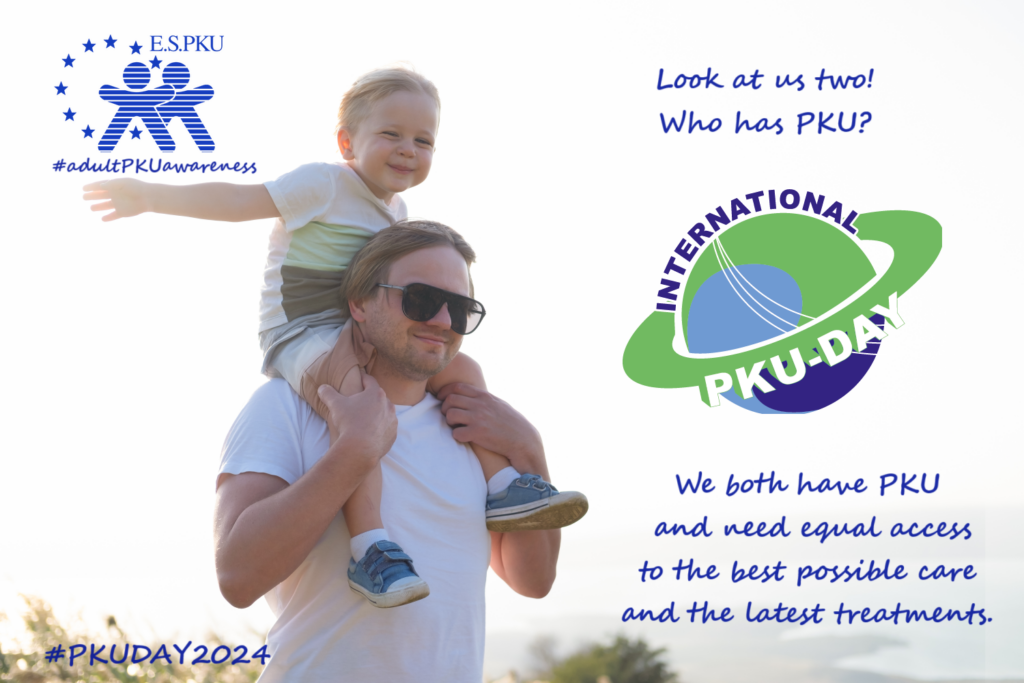“The fact that the benefits from PKU treatment in childhood are ‘clear and immediate’ does not equate that there are no benefits for PKU treatment in adulthood”
On June 28th PKU community celebrates International PKU Day. This year, E.S.PKU decided to raise awareness of adults with PKU by running a successful campaign “The Life of adults with PKU”. Throughout June on E.S.PKU social media various statements were published about the challenges of adults with Phenylketonuria.

Since Phenylketonuria (PKU) is diagnosed in the early stages of life (nowadays in newborn screening), it has traditionally been perceived as a childhood disease. The advancement of the research made it possible to agree on the need of diet-for-life in PKU patients during the late 1980’s and early 1990s. This widely acknowledged recommendation has had an impact on the standards of care and the PKU diet has been a bedrock of treatment since. This also has posed challenges both to the research community and the patients themselves. What are the optimal phe levels for adults with PKU? What is the possible impact of phenylketonuria on ageing? How to conciliate a very restrictive and costly diet with the challenges of everyday life? What happens if the diet is relaxed or not followed? These are just some of the questions that adult PKU care has to address. Several studies have shown that there are particular challenges for the adult community.
In adult PKU patients, difficulties with staying on diet or losing contact with the clinic are widely reported. This fact, along with a debate among professionals regarding the standards of care and PHEphe levels required, has recently prompted discussion within the community about the importance of condition management in adulthood. In particular, an editorial recently submitted to the American Journal of Clinical Nutrition authored by Lachmann and Langeveld, argued that
- There is no clear relevance of the adult “subtle alterations in cognitive functioning” and the impact of their psychological and social attainment.
- There are studies (limited in range) that show that some of the adverse events are mild, transient or resolving themselves.
Therefore, concluding that this news is “reassuring for adults with PKUpku who struggle to follow a low protein diet and feel that they can function normally with high Phe concentration” and suggesting that “if there is an unmet clinical need in PKU, it is to try and improve treatments for children” – suggesting the adult PKU healthcare is not a priority.
We consider that, given the burden of treatment, such statements are perilous for at least two reasons: a possible negative impact on their health and possible political implications of allegedly neutral statements.
Scarce evidence in rare diseases is one of the fundamental challenges for their proper treatment and poses epistemological concerns. But it is also a cause of high vulnerability in the public health domain. In the age of evidence-based decision-making, rare diseases are at a disadvantage when it comes to proving the benefits of their detection, treatment reimbursement, or access to care. PKU is, in this case, a story of success, as widely recognized in the medical community. Nevertheless, it also seems that it is often approached from a paediatric-centric perspective, and on different levels. In the first place, a paediatric-centric perspective in research means that there is more solid evidence about how PKU affects the underage patients. This situation is completely comprehensive due to the illness ́ history: in order to have a cohort of early-diagnosed and diet-compliant adults the first need is to take care of the children. The problem occurs when, drawing on this situation, assumptions are made regarding the ethical and political level. From the lack of evidence regarding safe levels of phenylalanine in adults or inconclusive studies about the impact of high phe levels on adult brain, we cannot draw the conclusion that they do not have unmet medical needs or that they are minor. On the contrary, we argue that this situation poses a challenge to the research community and uncovers a bigger “unmet need”: the need for proper guidelines for a significant part of the PKU community. If we fail to do so, we are risking their wellbeing and health. The fact that the benefits from PKU treatment in childhood are “clear and immediate” does not equate that there are no benefits for PKU treatment in adulthood, but rather that we need to increase efforts into research and evidence gathering.
And then, the claim that the unmet need of children with PKU should be prioritised, elevates the paediatric-centred view on disease to a new level, namely, sociopolitical one. Unmet needs are an important criterion in health technology assessment: the greater the need, the bigger the benefit, the more cost-effective it is to invest in the treatment. It also has an impact on social equality and access to care.
If we minimise the adult “unmet need”, we are risking that their care requirements will be under-recognized. Therefore, we should be very wary about the ethical neutrality of the research conducted on PKU patients, especially, when it comes to drawing conclusions that exceed the sheer evidence or lack thereof.
It is our contention that the adult PKU population faces their own challenges, and one of the biggest is that the evidence with regard to their standard of care is still in the making. This itself is an unmet need which does require attention.
As a society that advocates for the wellbeing of phenylketonuria patients and their families, in the absence of robust evidence currently, maintaining adult PHE levels within recommended standards seems reasonable, while the corpus of evidence is gathered. Furthermore we would encourage decision makers to share this view in order to procure the optimal outcome for all the PKU patients.
At the same time, we are aware that this objective can only be accomplished with the input of the PKU adults themselves. We also want to empower adult patients to voice their concerns and share their experiences with the professionals, associations, and stakeholders. Thus, we wish to promote engagement and ongoing discussions with PKU clinics and decision makers.
Share this post using #PKUDAY2024
